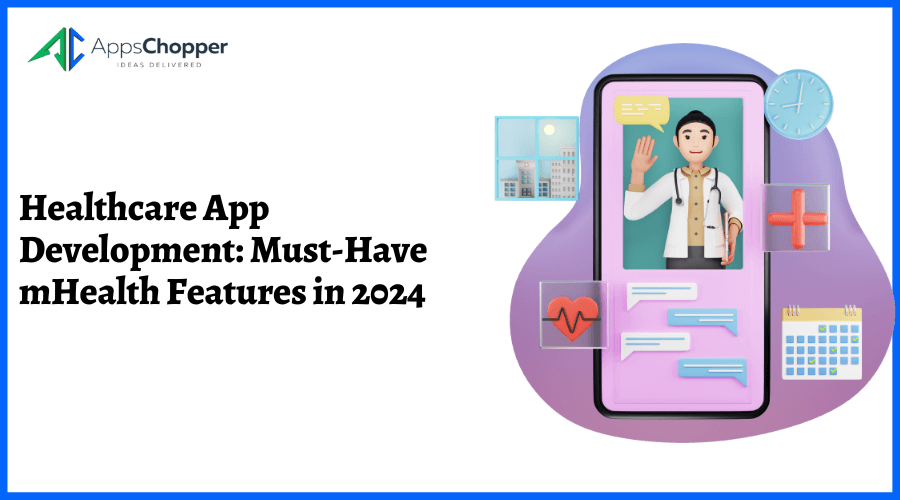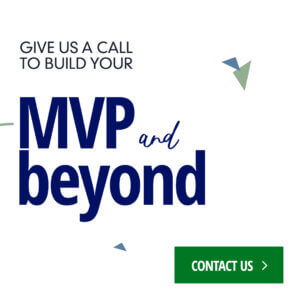Table of Contents
Several healthcare applications have been used over the years. But telehealth and telemedicine apps, which enable patients to communicate with medical experts virtually through consultations, have lately surfaced as a crucial use case. Recent years have seen a rise in the use of healthcare mobile apps, which have improved patient and physician satisfaction. By enabling consumers to get medical care and record their health data, intelligent features help reduce the need for in-person doctor appointments.
McKinsey reports that healthcare profit collection will grow with a CAGR of 7%, reaching the mark of $819 billion in 2027. This explains the sharp increase in healthcare app development, mainly for telehealth and telemedicine use cases. However, the healthcare sector has other opportunities, so telehealth use cases are not the only ones.
For instance, the healthcare app Flo enables users to monitor their menstrual well-being using a monthly calendar and predicts the upcoming cycle. It allows you to track your hormones and menstrual cycles and enhances your well-being routinely. With so many different use cases, mobile applications in the healthcare industry have grown and opened new business prospects for many companies. In light of this, the following feature sets and kinds should be considered while healthcare application development.
Rising Need for Mobile Apps in Healthcare Industry
The healthcare industry is witnessing a rising need for mobile apps caused by the demand for affordable and suitable healthcare services. Medical apps are essential tools for patients and healthcare providers, presenting many medical app features built to offer remote consultation and eliminate the need to visit hospitals. From appointment scheduling and medication reminders to telemedicine consultations and health tracking, the ever-evolving apps facilitate healthcare approaches and allow patients to take all the necessary measures.
The adoption of convenience allows hospitals to alter their daily processing. With AI and ML in focus, the change is persistent, transforming those long lines of patients into hassle-free doctor-patient sessions. Most of the world’s population prefers access to the Internet and other services through their mobile devices. This means healthcare services are not exempt from the increased mobile usage trends. Mobile apps and healthcare are bridging the gap for patients.
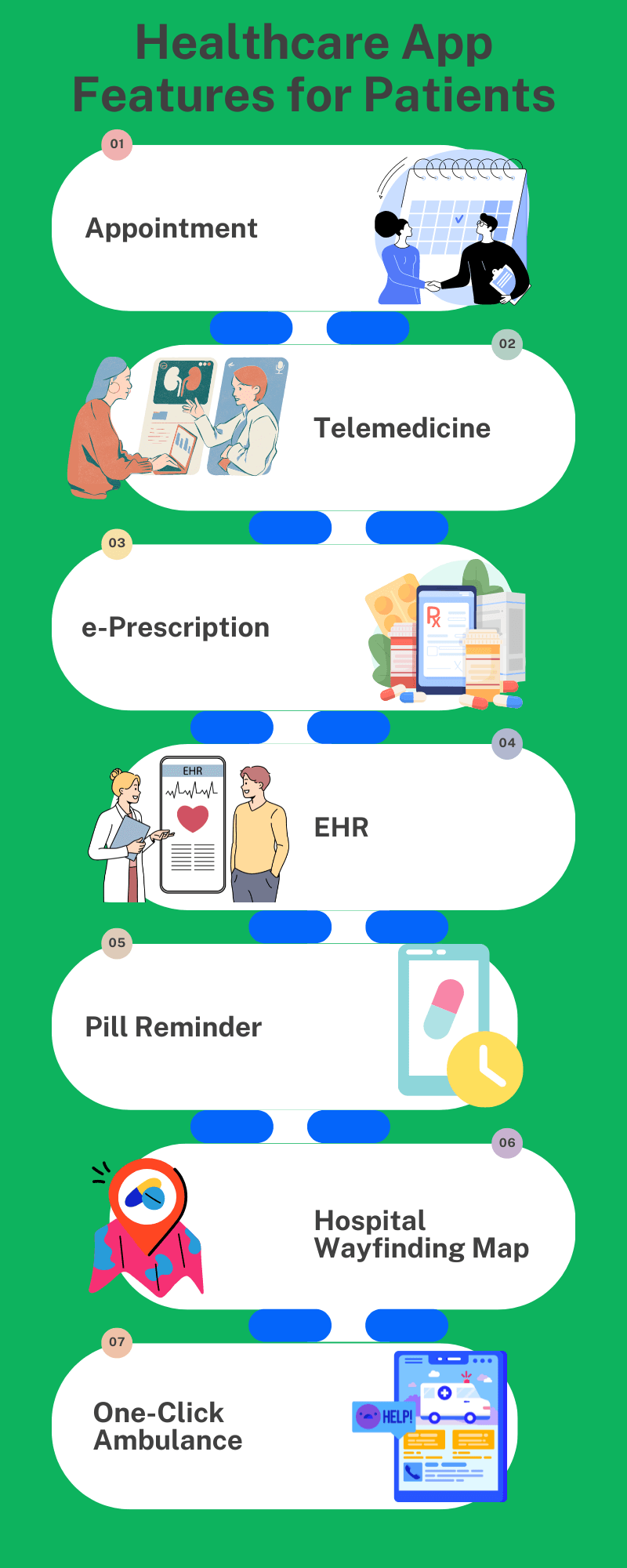
Healthcare App Features for Patients
The best healthcare apps for patients must have features to enhance patients’ comprehensive experience and simplify access to healthcare services. The idea is to offer patients an app that streamlines appointment scheduling functionality, offers immense data security, and allows them to get an e-prescription. Considering all the above needs, let us dive deep and understand the necessary features of healthcare apps.
1. Appointment
Making an online appointment is more convenient for patients and physicians and saves time by removing the need to wait in a queue. By linking qualified physicians, this feature of healthcare applications is dependable and well-integrated, enabling prompt access to consultations from any location globally.
2. Telemedicine
Physicians believe telemedicine is more effective than a 10-minute one-on-one visit for monitoring and treating chronic illnesses. Thanks to telemedicine app features, physicians and patients interact entirely differently despite their geographical distance. Telemedicine adoption has grown 59% in the last year. Text or video chat is a telemedicine app feature.
3. e-Prescription
Using an e-prescription tool, doctors may create and deliver prescriptions without mistakes. This improves communication, patient happiness, and time savings. The tool includes all of the data in electronically linked pharmacies and enables clinicians to examine prescription insurance formulary information.
4. EHR
Electronic health records can benefit doctors and patients. Thanks to them, they may access all of their medical records in one location. Examining medical imaging images remotely can also increase the tool’s functionality. Images are uploaded and shared via a server compliant with HIPAA Compliance for healthcare app development. Evaluating imaging scans remotely using a medical device may sometimes be just as successful as seeing them at a traditional workstation.
5. Pill Reminder
Since many people rely on pharmacological therapy to treat chronic diseases, patient loyalty to medicine and pharmaceuticals is an important consideration. Noncompliance with treatment regimens and medication schedules may negatively impact patient outcomes and healthcare expenses. This feature’s primary purpose is to serve as a reminder. Push alerts are sent out following the e-prescription. You are also free to create your timetable.
6. Hospital Wayfinding Map
Getting lost within hospitals is a frequent issue, particularly with elderly patients. It makes sense to lose out on the direction when there is multispecialty infrastructure. It is one of the dependable healthcare mobile app features that helps users locate everything more quickly, including their parking space and doctor. Giving visitors maps and pictures helps them navigate the hospital more efficiently, which lowers their anxiety.
7. One-Click Ambulance
This functionality is crucial when emergency problems arise in unexpected circumstances. One-click emergency calls are beneficial here. In an emergency, you may use this tool to ask for friends, family, or yourself. This function sends notifications to the hospital, reliable contacts, and the exact location. Additionally, you may locate neighboring pharmacies and labs to get assistance in an emergency.
The above features streamline the experience for patients in their specific app that offers them smooth appointment booking, ordering medicines online and many more.
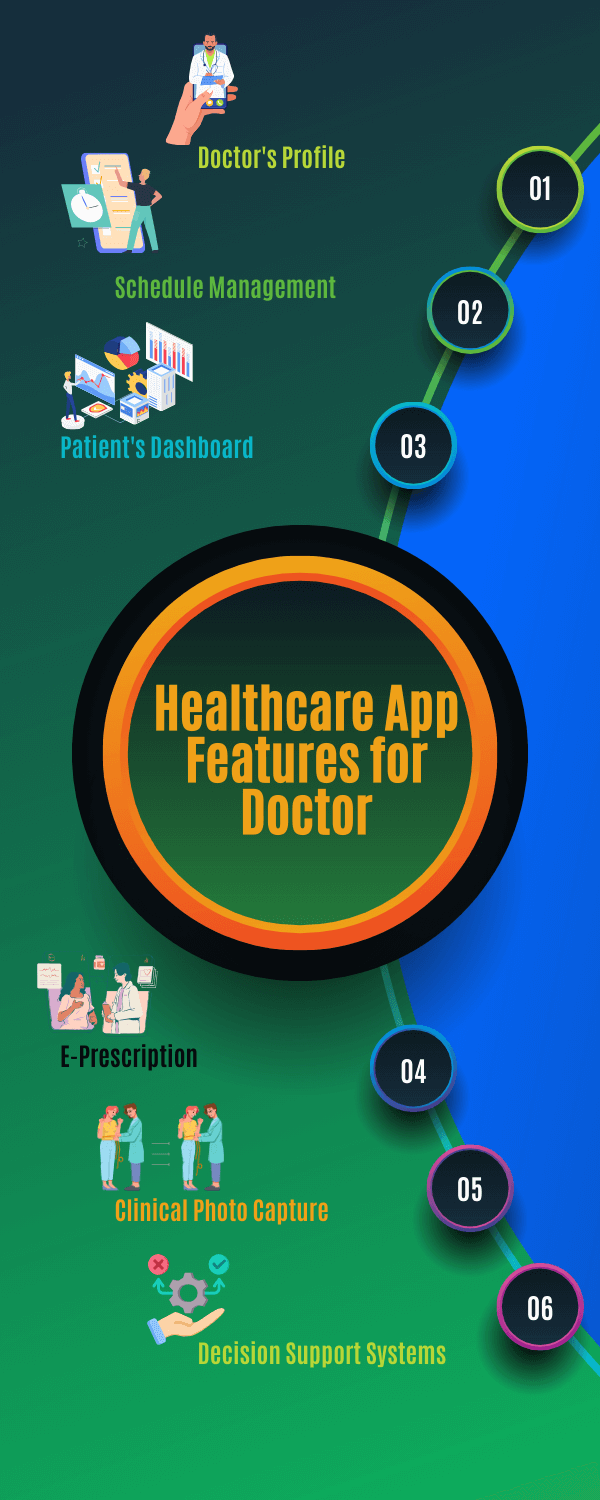
Healthcare App Features for Doctor
Similar to patient-specific, the industry offers healthcare apps for doctors. Streamlining the healthcare vertical not only limits itself to providing seamless services but also focuses on allowing doctors to cater to patients smoothly. With that in mind, let us understand the essential doctor application features for healthcare. With a healthcare app development guide, businesses can understand the need for a systematic approach to building doctor apps.
1. Doctor’s Profile
Selecting a suitable doctor is crucial in the patient’s journey. It is not proper to choose any doctor on the list. In addition to saving time, a doctor’s profile enhances the precision of the physician-patient matching process.
2. Schedule Management
This function provides physicians and patients with a dependable and valuable appointment scheduling experience. The physicians’ app is the only one with this functionality integrated.
3. Patient’s Dashboard
This summarizes the clinical and personal data associated with the patient. This website is a programmable display of vital patient data to provide prompt and effective therapy recommendations. The diagnostic history, test findings, dietary values, vital signs, therapies, prescriptions, radiological records, and other information may be included in the dashboard.
4. E-Prescription
If you’re unaware, ePrescription is a technological framework enabling physicians to create and deliver prescriptions to pharmacies and patients. A Surescripts report states that 44% of all medicines were written electronically the previous year. With iOS or Android app development services, institutions can offer the facility of e-prescription to a vast targeted audience.
5. Clinical Photo Capture
This function enables medical professionals to take consistent, high-quality patient pictures repeatedly. By using before-and-after photos, they may also cross-sell aesthetic goods and services and convert consultations into treatments. Multi-level security policies that safeguard their photographs and keep track of system access and photo-taking activities may be used to build the Clinical Photo Capture functionality. This HIPAA-compliant solution makes photo administration less time-consuming.
6. Decision Support Systems
At the point of care, mobile applications have developed into indispensable resources for clinical decision-making. Physicians can have unanswered clinical questions following every clinical interaction, and clinical decision-making systems are crucial in this situation, particularly for evidence-based medicine.
Healthcare providers must know the healthcare app development cost and plan both apps accordingly. The better the budget, the more advanced features they can access. With a reliable app development company, medical institutions widen their horizon and offer streamlined doctor-patient interactions.
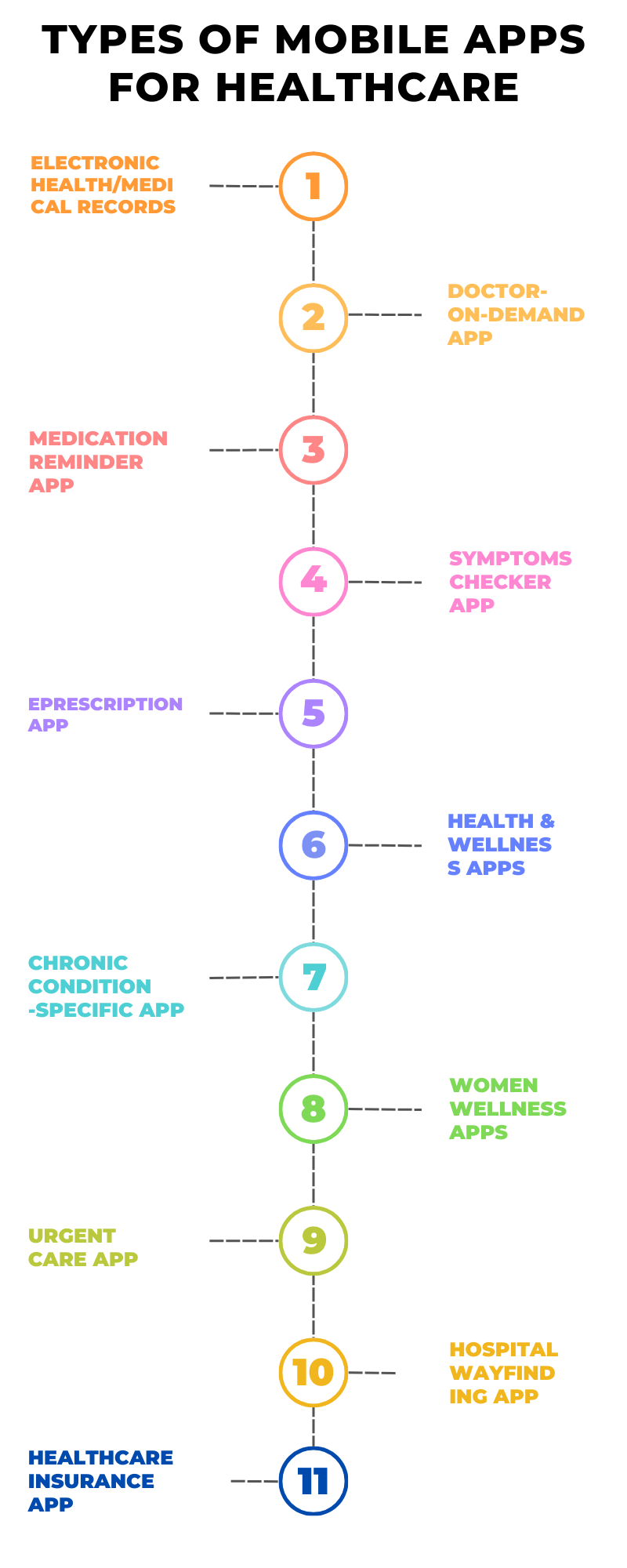
Types of Mobile Apps for Healthcare
The healthcare apps are not limited to just two apps for basic functions. There is a wide range of apps that offer users different kinds of features and functionalities according to their specific needs. Below are examples of different types of healthcare mobile apps.
1. Electronic Health/Medical Records
This system gathers the patient’s data and saves it in digital form. This technology across several care settings may streamline the process and reduce time-consuming paperwork. This free EHR software replicates how doctors think because it was created with doctors in mind. Medical app development covers electronic prescriptions, online form submission, billing software, and patient check-in.
2. Doctor-on-Demand App
Both consumers and physicians may benefit significantly from on-demand medical applications. Online appointment scheduling is made more accessible by the ability of these applications to function as a mobile directory. Other capabilities include looking up doctors by name, location, or specialty, contacting and scheduling appointments, investigating insurance and billing, etc. Patients can use this online tool to schedule appointments with a doctor, psychologist, or lactation consultant on their phone, tablet, or computer. In addition, all of the doctors are board-certified, and video visits are available for many common ailments and issues.
3. Medication Reminder App
Medication reminder applications might be beneficial if general forgetfulness is causing problems for you when sticking to your drug schedule. These medical app features may sound like an alarm beep or vibration. This shows when all your medications are due and includes instructions like “take with food.” One fantastic function is the ability to notify friends and family if you miss a dosage.
4. Symptoms Checker App
The symptoms checker allows an in-the-know individual to assess the symptoms of common health issues. You can quickly assess your health by using the preloaded health symptoms. Check the indicators using Symptomatic in three simple steps: input the symptoms, respond to a few inquiries, and review the outcome. Be it Android or iPhone app development, reliable companies help you build a symptoms checker app with ease.
5. ePrescription App
The process of electronically transmitting a prescription to the pharmacist is called ePrescription. This removes the requirement for convoluted phone, fax, or write-in prescriptions. The error margin is shallow with ePrescription, saving time in both directions. You can prescribe any medication, anywhere, using this software on your phone. PDMP databases may be consulted, medication histories can be seen, and drug and allergy warnings can be received.
6. Health & Wellness Apps
Healthcare applications that target specific groups, such as those related to nutrition, exercise, healthy eating, and mental well-being, have increased dramatically in recent years. This provides an enormous food database with more than 5 million distinct food varieties and components. Thanks to its integrated calorie meter with health and wellness app features, you can track your daily caloric intake in just five minutes. Fitbit and Apple Health are among the more than 50 gadgets with which it may be linked.
7. Chronic Condition-Specific App
Centers for Disease Control & Prevention data shows chronic illnesses account for more than 75% of healthcare costs. Condition-specific applications come in handy in these situations. This diabetes management tool explains how food consumption, physical exercise, and medication impact blood glucose levels.
8. Women Wellness Apps
Specific app categories are dedicated only to women’s health and well-being. More than 15 million moms have used this worldwide. All you need to do is input your baby’s due date, and it will follow their progress both weekly and daily. It will recommend professional advice and valuable publications based on the baby’s developmental stage.
This ovulation and period tracker software uses science and statistics to assist women in identifying distinctive patterns in their menstrual cycles. It allows you to plan for pregnancy, log birth control, and keep track of when your next period is due.
9. Urgent Care App
In an emergency, a reliable provider’s urgent care app may be a valuable resource for those needing assistance. This app focuses on providing emergency treatment. With it, you can find nearby healthcare professionals and quickly call for an ambulance. It might include a click-on ambulance, a map of the closest urgent care centers, and much more.
10. Hospital Wayfinding App
These applications give your hospital’s mobile wayfinding app an indoor mapping platform with indoor turn-by-turn navigation, indoor location awareness, and context-aware messaging. This may also expand the features of parking tags, check-in, and other things. There is evidence that wayfinding apps enhance patient experiences. They surround a particular facility with beacons and geofences to provide a precise location.
11. Healthcare Insurance App
With healthcare insurance app development, insurance firms can offer users apps that assess their financial status to estimate the offerable insurance. The purpose of an insurance app is to analyze the user, help them apply, and later claim their insurance benefits.
Why Choose AppsChopper As Your Healthcare App Development Company?
AppsChopper, your mobile app healthcare provider, guarantees immense advantages to enhance hospital functioning with scalable applications. With professional expertise in healthcare, AppsChopper is a forward-thinking company that understands the industry’s complexities, HIPAA compliances, regulations, and challenges.
We create custom solutions to fit the needs of healthcare organizations. Whether it’s building patient portals, telemedicine apps, or fitness trackers, we have professional future-ready solutions. Our commitment to systematic development ensures robust and dependable applications that comply with stringent regulations like HIPAA, protecting patient data.
